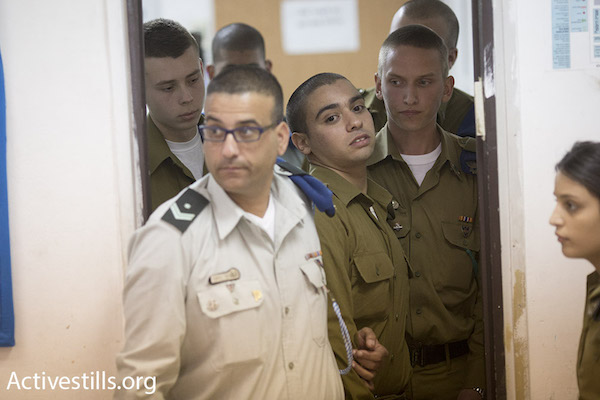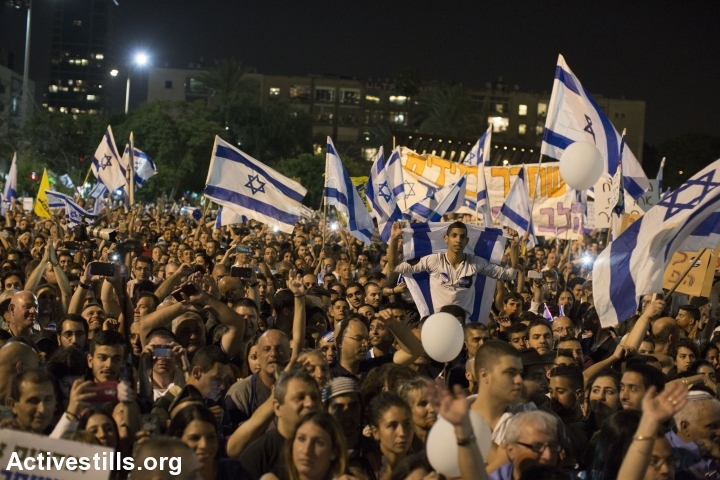No need for a trial. Sergeant Elor Azaria is already innocent in the eyes of the Israeli public
By David Sarna Galdi

The trial of Sergeant Elor Azaria, a soldier indicted for the killing of an incapacitated Palestinian knife-attack suspect in Hebron last month will mostly likely begin soon, but it isn’t really necessary. If public opinion and legal precedent tell us anything, his fate has already been sealed and his future looks very bright indeed.
The soldier’s guilt was plainly evident from day one, shown in the video of the incident released by B’Tselem, which as Gideon Levy wrote, “incriminates as much as a thousand witnesses.” But somehow, within hours of the video’s release, the Israeli soldier seen executing a helpless, already “neutralized” Palestinian who posed no immediate danger, was being embraced as a national hero.
A poll published by Channel 2 News on the weekend after the shooting showed that 57 percent of the Israeli public disagreed with the army’s arrest and investigation into Sgt. Azaria, and 42 percent of those surveyed found his behavior “acceptable” and “responsible.” Within days, tens of thousands of Israelis signed an online petition calling for the soldier to be given a merit citation. Over 1,000 people rallied outside the military court. In a cabinet meeting Education Minister Naftali Bennett expressed what can only be interpreted as blanket tolerance for soldiers’ crimes (at least against Palestinians). Prime Minister Benjamin Netanyahu outrageously breached the border between politics, judicial process and good taste by phoning the father of the murder suspect, in the middle of the investigation, to convey his empathy.
This week Azaria’s parents organized a rally calling for his release in Tel Aviv’s Rabin Square. In attendance were several thousand people, a portion of whom waved banners featuring racist slogans and shouted offensive chants like, “Death to the Arabs” and “Hopefully all your villages will burn.”
It’s not hard to figure out which way the wind is blowing. Instead of being banished from the camp of public opinion, the soldier continues to be depicted as a victim and martyr, the Joseph Trumpeldor of the Snapchat generation.
One need only look at the lack of judicial follow-through in similar recent incidents to realize just how unprecedented it is that Sgt. Azaria’s case even made it as far as an indictment. Last September, soldiers in Hebron shot and killed a 19-year-old woman who crossed through a checkpoint with a knife. Soldiers shot her some seven times after she was already on the ground, posing no immediate threat. An investigation concluded that the soldiers had erred but decided not to punish them. Likewise, a military probe into Col. Yisrael Shomer, who shot and killed a fleeing 17-year-old suspected of throwing a stone (which hurt nobody), was closed this week, concluding that the fatal shooting was a “mistake.” Oops.

Soldiers, operating under stress and danger, forced to make split-second decisions, are human and make mistakes. However, the pattern of seemingly unwarranted killings of Palestinian suspects and the lack of punishment of soldiers involved is glaring. A military court won’t throw the book at Sgt. Azaria. He will probably be given a largely symbolic punishment. He won’t see the inside of a jail cell; maybe he’ll be dishonorably discharged. He’ll walk out of the courtroom into the embrace of a loving nation and the annals of Zionist history. He’ll have a book deal and a brand new illegal West Bank Settlement named after him within a year. Who knows, he might even end up in the Knesset.
Rogel Alpher, in a Haaretz op-ed, stated that, “The murder of the suspected attacker in Hebron is the most significant murder in Israel since Yitzhak Rabin,” and he is correct. Not because it matters what will happen to the loathsome soldier after his trial; we can leave him to heaven. What is much more important than the particular case is the appalling reality it revealed: a nation of unapologetic racists.
The dark side of the Israeli ethos is not new. In 1949, then Foreign Minister Moshe Sharett aggravatedly wrote, “Some Jews think every Arab is a dog, a wild dog that it’s a mitzvah to kill.” But now, racism and hate have become aspirational. Progressive, enlightened Israelis must face the revelation of the Hebron soldier’s trial: that what they dismissed as the racism, hatred and disdain for democracy of a small percentage of the fanatic far-right is actually the face of large cross-sections of the nation. A recent survey of Israeli high school students found that only 52 percent of those polled believed that Israeli Arabs should even be allowed to be a members of the Knesset.
Large numbers of Israelis sympathize with the soldier not despite the fact that he killed an Arab, but because he killed an Arab. He is not a pariah, but a reflection of his surroundings — one young soldier in a huge army of misguided citizens employed to oppress millions of people, a cog in the occupation and settlement industry that has been perpetrating injustices for 49 years. Anyone who tries to excuse Israeli racism as a product of ongoing violent conflict is mistaken. The equivalent would be justifying anti-Semitism because of Bernie Madoff, Mark Rich, Ivan Boesky, Arkadi Gaydamak, Michael Milken, John Gutfreund and history’s plethora of Jewish white-collar criminals.
Israeli racism and ignorance is scary because is not shy, unspoken or relegated to a certain demographic or the geographical or ideological edges of society. It’s in your face. It can be found as frequently among so-called liberal and cultural elites as in it can in working class neighborhoods and marginalized groups.
A video I recently found on my Facebook feed, that had gone viral (420,000 views and 15,000 likes) features Doron Beaton, an Israeli comedian, addressing the virtual nation, reminding Israelis that, “We have a brother [Sgt. Azaria],” whose family will spend Passover “choked with tears” while he is locked-up awaiting trial, all because he fulfilled his obligation to fight for a nation “free in its own land,” quoting the Passover liturgy. He ends the tearjerker by stating, “I myself don’t feel free at all this Passover.” (A military court has since granted Azaria furlough to spend the holiday with his family.)
Beaton’s video undoubtedly touches a nerve with many Israelis, a nation of soldiers whose fathers, brothers, sons and friends have fought and died in decades of conflict. The video fails to mention, however, that for the entirety of the upcoming Passover holiday, the 2.8 million Palestinians of the West Bank will be under military closure, their freedom of movement restricted. I wonder if the 88,000 Palestinian laborers who are unable to provide for their families for a week will feel particularly “free” this holiday.
For better or worse, this case is not a bizarre, grisly murder in some far-off, godforsaken hillside of the West Bank, committed by a radical settler on the fringes of society. The suspected killer in this story is, “everyone’s son,” which is precisely what makes it so repulsive.
David Sarna Galdi is a former editor at Haaretz newspaper and activist. He currently works for an Israeli nonprofit organization in Tel Aviv.

